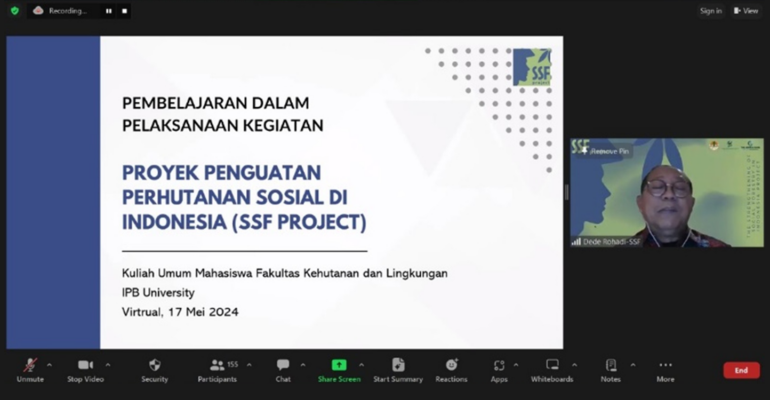Deepening Students’ Insight on Social Forestry, IPB University Holds Public Lecture

The Forest Management Department of the Faculty of Forestry and Environment of IPB University held a public lecture for undergraduate programs in the Community Forestry course. The public lecture took place on 17/5 online.
The public lecture was attended by three speakers who have outstanding competence and expertise in the field of social forestry. They were Dr Mahfuz, Secretary of the Director General of Social Forestry and Environmental Partnerships, Dr HAS Chadir Syam, Regent of Maros, and Dr Dede Rohadi, an expert in the Strengthening Social Forestry (SSF) project.
Dr Mahfudz discussed the dynamics and challenges facing social forestry and environmental partnerships. Dr Mahfudz revealed that social forestry has short, medium, and long term impacts, such as system improvement, domestic economic improvement, and decreased tenure conflicts.
“The social forestry program also supports the achievement of Sustainable Development Goals (SDGs), such as poverty alleviation, food security, and gender equality. The synergy between programs, the commitment of regional leaders, and the development of integrated areas based on social forestry are the focus in efforts to improve community welfare and environmental preservation,” he explained.
Dr Chadir Syam explained about the development of social forestry in Maros District. “Social forestry in Maros District covers an area of 3,190 hectares consisting of 21 social forestry groups (KPS) and 45 social forestry business groups (KUPS) involving 1,096 family heads,” he said.
He said that 12 types of commodities such as sugar palm, honey, coffee, and durian are managed on the land. The local government plays a role in encouraging stakeholder synergy, integrating social forestry business development programs in regional development plans, and strengthening the coordinative role of the Regional Secretary.
Meanwhile, Dr Dede Rohadi explained about the Strengthening Social Forestry in Indonesia project, which is implemented by the World Bank. He explained that the project has a duration of five years with a grant of USD 14,317,909.
“The project objective is to increase access rights and strengthen community management in the use of forest areas allocated for social forestry, with targets of area given to the community, area managed with sustainable landscape management practices, and greenhouse gas mitigation and provide benefits for 150,000 people, including 30 percent of women,” he said.
Dr Dede also revealed that during the project implementation, several important lessons were identified. The role of mentors or extension workers is recognized as a key element, but their limited number and capacity is a challenge. “Strategies to overcome this include recruitment, empowerment of non-social forestry extension workers, and continuous training,” he said. (*/Lp) (IAAS/ZQA)



